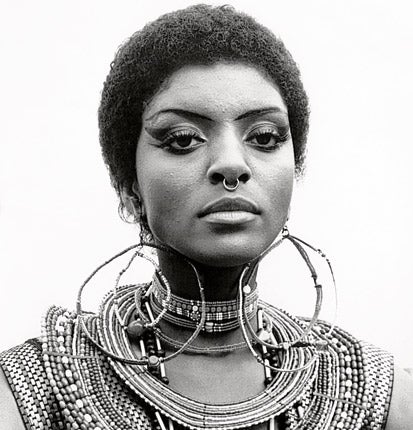Vonetta McGee: Actress who made her name in the 'blaxploitation' genre

Your support helps us to tell the story
From reproductive rights to climate change to Big Tech, The Independent is on the ground when the story is developing. Whether it's investigating the financials of Elon Musk's pro-Trump PAC or producing our latest documentary, 'The A Word', which shines a light on the American women fighting for reproductive rights, we know how important it is to parse out the facts from the messaging.
At such a critical moment in US history, we need reporters on the ground. Your donation allows us to keep sending journalists to speak to both sides of the story.
The Independent is trusted by Americans across the entire political spectrum. And unlike many other quality news outlets, we choose not to lock Americans out of our reporting and analysis with paywalls. We believe quality journalism should be available to everyone, paid for by those who can afford it.
Your support makes all the difference.The American actress Vonetta McGee cast a spell over cinema-goers throughout continental Europe when she appeared in Il Grande Silenzio (1968), the downbeat, snowbound Italian Western directed by Sergio Corbucci. She had large, expressive eyes and brought great dignity and a haunting quality to the role of Pauline, a widow who hires a mute gunfighter, played by Jean-Louis Trintignant, to avenge the killing of her husband by Klaus Kinski's unscrupulous bounty hunter. The film was remade as Joe Kidd with Clint Eastwood in 1972, and Eastwood cast McGee in The Eiger Sanction, his mountaineering action thriller, in 1975.
But McGee was best known for the run of blaxploitation films she madein the early Seventies, starting with Melinda and including such classicsof the genre as Blacula, Hammer and Shaft in Africa, as well as Detroit 9000 and Thomasine & Bushrod. Yet shedisliked the blaxploitation label. Itis used, she said in 1979, "like racism, so you don't have to think of the individual elements, just the whole. If you study propaganda, you understand how this works."
Two years earlier, in Arthur Barron's Brothers, McGee and Bernie Casey had portrayed characters based on theradical black activist Angela Davis and Black Panther and prison inmate George Jackson, but she spent therest of the 1970s and most of the'80s taking one-off or recurrent parts in TV series like Starsky and Hutch, Diff'rent Strokes, Cagney & Lacey and LA Law. In 1983, the British director Alex Cox cast her in his breakthrough low-budget movie Repo Man, but, when he tried to convince her to appear in Repo Chick last year, she announced that she had retired.
Born in San Francisco in 1945, McGee was supposed to study law but began participating in amateur theatre productions in basements and church halls, "a lot of things with no pay," as she later recalled. In 1967, she went to Italy and landed the title role in the Luigi Magni comedy Faustina. Sidney Poitier saw her in Il Grande Silenzio and requested that she appear in Guess Who's Coming to Dinner (1968) – she is not credited – and in The Lost Man, Robert Alan Aurthur's 1969 heist movie. In 1970 she had a small part in The Kremlin Letter, John Huston's Cold War thriller, and a more substantial one in The Big Bust Out, a trashy prison flick shot in Italy.
McGee enjoyed the blaxploitation films she made, even if she didn't stamp her identity on the genre in the same way as Pam Grier or Tamara Dobson. Indeed, in 1972, Warner Brothers executives chose Dobson over McGee for Cleopatra Jones, despite the fact that her long-standing boyfriend, the actor, writer and producer Max Julien, had written the story for her.
Still, Hugh A Robertson's Melinda (1972), in which she starred alongside Calvin Lockhart, was a fine riff on a premise similar to Laura, the Otto Preminger film noir with Gene Tierney and Dana Andrews. McGee proved especially mesmerising in the dual part of Luva and Tina in William Crain's Blacula (1972) with William Marshall as a vampiric African prince. She also worked with two other blaxploitation legends, Fred Williamson in Hammer (1972), directed by Bruce D Clark, and Richard Roundtree in John Guillermin's Shaft in Africa (1973), in which she played an Ethiopian princess.
In 1974, McGee and Julien co-starred in Thomasine & Bushrod, a "black" Bonnie and Clyde helmed by the Superfly director Gordon Parks Jr, but Columbia Pictures didn't promote the movie properly and the couple subsequently broke up. In 1984, she was cast as the wife of detective Mark Petrie in Cagney & Lacey and married her on-screen husband, Carl Lumbly, two years later. Following the birth of their son, Brandon, in 1988, she was less active but had a memorable cameo opposite Danny Glover in Charles Burnett's To Sleep with Anger in 1990.
McGee died after a cardiac arrest. Paying tribute to this talented, underrated leading lady, her Hammer co-star Williamson said: "Vonetta McGee was like a lot of actors and actresses at that time, like myself, Jim Brown, Billy Dee Williams, in that we had more talent than we were allowed to show because everything was perceived as a black project. Once they categorise you, your marketability becomes limited."
Pierre Perrone
Lawrence Vonetta McGee, actress: born San Francisco 14 January 1945; married Carl Lumbly (one son); died Berkeley, California 9 July 2010.
Join our commenting forum
Join thought-provoking conversations, follow other Independent readers and see their replies
Comments